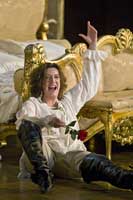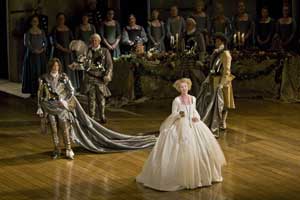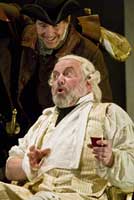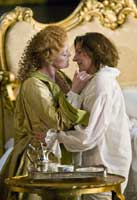ENO
22nd May
 Der Rosenkavalier needs to be staged from strength and thankfully the ENO has ample reserves at present to do the work justice. David McVicar's production focuses on the nuances of character development and all of the cast are able to respond to his desire to unlock the complexity of the individuals rather than simplistically sweep us away with glorious sound. John Tomlinson's Ochs may be a country boor but he has a very clear understanding of what is going on in Vienna. While momentarily made a fool of in the last act it is clear he sees through the Marschallin and her rather tacky affair. Nobody comes off well, and if the young couple are happy at the end it is unclear how long this will last. The Marscallin's plea to Octavian that he does not grow up like all other men is probably falling on deaf ears.
Der Rosenkavalier needs to be staged from strength and thankfully the ENO has ample reserves at present to do the work justice. David McVicar's production focuses on the nuances of character development and all of the cast are able to respond to his desire to unlock the complexity of the individuals rather than simplistically sweep us away with glorious sound. John Tomlinson's Ochs may be a country boor but he has a very clear understanding of what is going on in Vienna. While momentarily made a fool of in the last act it is clear he sees through the Marschallin and her rather tacky affair. Nobody comes off well, and if the young couple are happy at the end it is unclear how long this will last. The Marscallin's plea to Octavian that he does not grow up like all other men is probably falling on deaf ears.
The main soloists are all more than capable of showing us the multi-facetted characters with an extrovert Octavian from Sarah Connolly finely matched by a bright if often naive Sophie from Sarah Tynan. Octavian is bowled over, but seems too sophisticated to find the girl attractive for very long – as the last duet hints in its spiky orchestration.

Janice Watson's Marschallin is reserved and careful in her relationships, aware that Octavian has outgrown her but not yet willing to give up young men altogether.

 It is interesting that her page Mohammed is here an adult rather than the little boy so often seen, and, as the final moment shows us, a sexually aware adult at that.
It is interesting that her page Mohammed is here an adult rather than the little boy so often seen, and, as the final moment shows us, a sexually aware adult at that.
The large cast has a fine collection of familiar ENO faces, and it was particularly pleasing to find Alfie Boe, standing in at very short notice, in magnificent voice as the Tenor.
Singing is of an exceptionally high quality throughout, with the final trio and duet crowning a glorious evening.
The orchestra reacted with precision and romantic warmth to Edward Gardner's deft handling, particularly pleasing in more reflective passages.
While David McVicar's production moves with grace and sensitivity to the text it is a pity that his designs are dull and uniform, giving no sense of the changes in class and financial structure which Hofmannstahl requires. The programme article tries to argue for a 1920s eye-view of the work, but on stage the idea translates into a tatty dullness. A pity when everything else is so good.
BH
